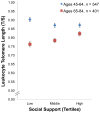Low social support is associated with shorter leukocyte telomere length in late life: multi-ethnic study of atherosclerosis
- PMID: 23370895
- PMCID: PMC3881963
- DOI: 10.1097/PSY.0b013e31828233bf
Low social support is associated with shorter leukocyte telomere length in late life: multi-ethnic study of atherosclerosis
Abstract
Objective: The primary goal was to test the hypothesis that limited social support (SS) is related to shorter leukocyte telomere length (LTL), particularly in an older adult population.
Methods: Cross-sectional analyses were performed on 948 participants aged 45 to 84 years at Examination 1 of the Multi-Ethnic Study of Atherosclerosis (18.4% white, 53.1% Hispanics, and 28.5% African American). LTL was determined by using quantitative polymerase chain reaction, and SS was measured with the Enhancing Recovery in Coronary Heart Disease SS inventory.
Results: Across the entire sample, SS was not associated with LTL (p=.87) after adjusting for demographic (age, sex, race/ethnicity, socioeconomic status), age×sex, age×race, health (body mass index, diabetes, pulse pressure), and life-style factors (smoking, physical activity, diet); however, the interaction term age (dichotomized)×SS was significant (p=.001). Stratification by age group revealed a positive association between SS (score range, 5-25) and LTL in the older (65-84 years; B[SE]=.005[.002]; p=.007) but not younger participants (45-64 years; p=.12) after adjusting for covariates.
Conclusions: These results from a racially/ethnically diverse community sample of men and women provide initial evidence that low SS is associated with shorter LTL in adults aged 65 years and older and is consistent with the hypothesis that social environment may contribute to rates of cellular aging, particularly in late life.
Figures
References
-
- Seeman TE. Social ties and health: the benefits of social integration. Ann of Epidemiol. 1996;6:442–51. - PubMed
-
- Seeman TE. Health Promoting Effects of Friends and Family on Health Outcomes in Older Adults. The Science of Health Promotion. 2000;14:362–370. - PubMed
-
- Carstensen LL, Fung HH, Charles ST. Socioemotional selectivity theory and the regulation of emotion in the second half of life. Motivation and Emotion. 2003;27:103–123.
Publication types
MeSH terms
Grants and funding
- R01 HL101161/HL/NHLBI NIH HHS/United States
- N01 HC095167/HC/NHLBI NIH HHS/United States
- T32-MH19925/MH/NIMH NIH HHS/United States
- N01 HC095161/HC/NHLBI NIH HHS/United States
- N01 HC095164/HC/NHLBI NIH HHS/United States
- N01-HC 95159/HC/NHLBI NIH HHS/United States
- T32 MH019925/MH/NIMH NIH HHS/United States
- N01-HC 95169/HC/NHLBI NIH HHS/United States
- N01 HC095169/HC/NHLBI NIH HHS/United States
- N01 HC095168/HC/NHLBI NIH HHS/United States
- N01 HC095163/HC/NHLBI NIH HHS/United States
- N01 HC095162/HC/NHLBI NIH HHS/United States
- N01 HC095159/HC/NHLBI NIH HHS/United States
- N01 HC095166/HC/NHLBI NIH HHS/United States
- N01 HC095160/HC/NHLBI NIH HHS/United States
- N01 HC095165/HC/NHLBI NIH HHS/United States
- P30 AG017265/AG/NIA NIH HHS/United States
LinkOut - more resources
Full Text Sources
Other Literature Sources
Medical
Molecular Biology Databases


